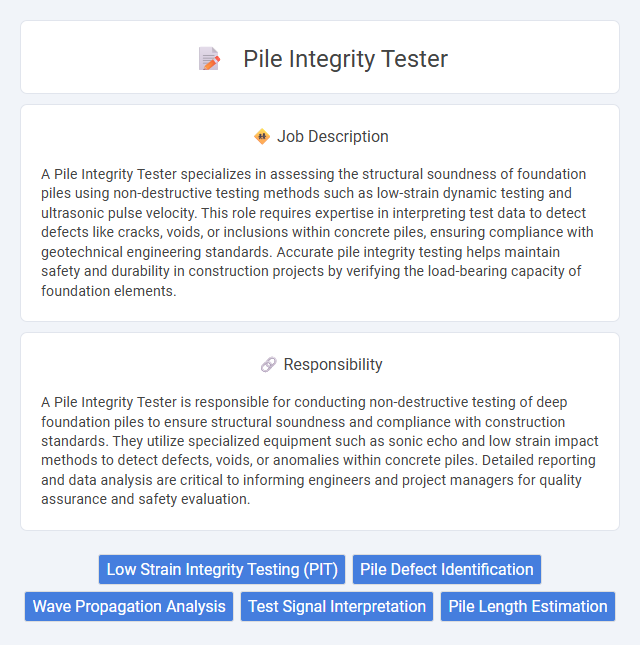
A Pile Integrity Tester specializes in assessing the structural soundness of foundation piles using non-destructive testing methods such as low-strain dynamic testing and ultrasonic pulse velocity. This role requires expertise in interpreting test data to detect defects like cracks, voids, or inclusions within concrete piles, ensuring compliance with geotechnical engineering standards. Accurate pile integrity testing helps maintain safety and durability in construction projects by verifying the load-bearing capacity of foundation elements.
Individuals with strong attention to detail and a solid understanding of construction and engineering principles are likely suitable for the role of a pile integrity tester. Candidates who can work well in outdoor environments, handle technical equipment, and interpret data accurately may find this job fitting. Physical stamina and the ability to work safely at construction sites also increase the probability of success in this position.
Qualification
A Pile Integrity Tester must possess a strong background in civil engineering or construction technology, often requiring a bachelor's degree in these fields. Proficiency in operating ultrasonic and sonic testing equipment, alongside an understanding of geotechnical analysis and non-destructive testing methods, is essential. Relevant certifications such as NDT Level I or II and experience with pile load testing significantly enhance job qualifications.
Responsibility
A Pile Integrity Tester is responsible for conducting non-destructive testing of deep foundation piles to ensure structural soundness and compliance with construction standards. They utilize specialized equipment such as sonic echo and low strain impact methods to detect defects, voids, or anomalies within concrete piles. Detailed reporting and data analysis are critical to informing engineers and project managers for quality assurance and safety evaluation.
Benefit
A Pile Integrity Tester likely offers significant benefits by ensuring the structural soundness of foundation piles, which may reduce the risk of costly repairs and structural failures. This job probably enhances safety on construction sites by early detection of defects or inconsistencies in piles. Employing a Pile Integrity Tester could improve project efficiency by enabling quicker and more accurate assessments compared to traditional methods.
Challenge
Working as a Pile Integrity Tester likely involves the challenge of accurately assessing deep foundation structures under varying ground conditions, which can affect signal clarity and test reliability. The job probably demands strong analytical skills to interpret complex data and identify potential defects or inconsistencies in piles. It may also require adaptability to different site environments and the ability to troubleshoot equipment or testing procedures on the spot.
Career Advancement
Pile integrity tester specialists gain expertise in evaluating foundation soundness through advanced non-destructive testing techniques, increasing demand in construction and civil engineering sectors. Mastery in ultrasonic and sonic echo methods opens pathways to senior inspection roles, project management, and consultancy positions within infrastructure development. Certified professionals often experience accelerated career growth by contributing to critical safety assessments and compliance with engineering standards.
Key Terms
Low Strain Integrity Testing (PIT)
Low Strain Integrity Testing (PIT) specialists evaluate deep foundation elements to detect material discontinuities and defects using nondestructive methods. They operate specialized equipment that generates stress waves through piles, analyzing signal reflections to assess structural integrity and identify cracks, voids, or inclusions in concrete piles. Expertise in interpreting waveform data and understanding soil-pile interaction is crucial for ensuring compliance with engineering standards and confirming pile performance in construction projects.
Pile Defect Identification
Pile integrity testers utilize advanced sonic and ultrasonic wave technology to detect anomalies such as cracks, voids, and inclusions within concrete piles, ensuring structural soundness. Accurate pile defect identification helps prevent costly failures by providing essential data on pile length, consistency, and uniformity. These specialists analyze waveform reflections to pinpoint defects that compromise load-bearing capacity, improving construction quality and safety compliance.
Wave Propagation Analysis
Wave Propagation Analysis in pile integrity testing involves sending stress waves through foundation piles to detect structural anomalies such as cracks, voids, or changes in material properties. The tester interprets the reflected wave patterns to assess pile length, detect defects, and ensure compliance with design specifications. Accurate analysis requires expertise in signal processing and understanding wave behavior in different soil and pile conditions.
Test Signal Interpretation
Interpreting test signals in pile integrity testing requires analyzing waveform data to identify anomalies such as voids, cracks, or changes in cross-sectional area within foundation piles. Accurate signal interpretation enables engineers to assess the structural integrity and load-bearing capacity of piles, ensuring reliable foundation performance. Advanced software tools and expertise in signal patterns improve diagnosis accuracy, reducing risks in construction projects.
Pile Length Estimation
A Pile Integrity Tester uses non-destructive testing methods such as low-strain dynamic testing and sonic echo techniques to accurately estimate pile length and detect defects within the pile structure. This role requires analyzing stress wave reflections to determine whether the pile reaches the design depth or is shortened by obstructions or damages. Expertise in interpreting test data ensures reliable evaluation of pile length, critical for foundation quality assurance and construction safety compliance.
 kuljobs.com
kuljobs.com